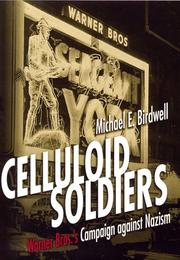| Listing 1 - 10 of 77 | << page >> |
Sort by
|

ISBN: 0814713386 0585318778 0814739253 0814798713 Year: 1999 Publisher: New York London New York University Press
Abstract | Keywords | Export | Availability | Bookmark
 Loading...
Loading...Choose an application
- Reference Manager
- EndNote
- RefWorks (Direct export to RefWorks)
Book
ISBN: 9004423524 9004423516 Year: 2020 Publisher: Leiden, Netherlands : Brill,
Abstract | Keywords | Export | Availability | Bookmark
 Loading...
Loading...Choose an application
- Reference Manager
- EndNote
- RefWorks (Direct export to RefWorks)
"What role did cinema play in the Chinese Communist Party's political project of shaping ideal socialist citizens in the early People's Republic? In Moulding the Socialist Subject, Xiaoning Lu deploys case studies from popular film genres, movie star culture and rural film exhibition practices to argue that Chinese cinema in 1949-1966, at once an important political instrument, an enjoyable yet instructive form of entertainment, and a specific manifestation of the socialist society of the spectacle, was an everyday site where the moulding of the new socialist person unfolded. While painting a broad picture of Chinese socialist cinema, Lu credits the human agency of film professionals, whose self-reflexivity and individual adaptability played an intrinsic role in the Party's political project".
Book
Abstract | Keywords | Export | Availability | Bookmark
 Loading...
Loading...Choose an application
- Reference Manager
- EndNote
- RefWorks (Direct export to RefWorks)
Riefenstahl, Leni --- National socialism and motion pictures

ISBN: 0292734581 Year: 2001 Publisher: Austin (Tex.) : University of Texas press,
Abstract | Keywords | Export | Availability | Bookmark
 Loading...
Loading...Choose an application
- Reference Manager
- EndNote
- RefWorks (Direct export to RefWorks)
Motion pictures --- National socialism and motion pictures. --- History
Book
ISBN: 3934305121 Year: 2000 Publisher: Köln : Teiresias,
Abstract | Keywords | Export | Availability | Bookmark
 Loading...
Loading...Choose an application
- Reference Manager
- EndNote
- RefWorks (Direct export to RefWorks)
Motion pictures --- National socialism and motion pictures. --- History

ISBN: 0691115184 0691115192 Year: 2004 Publisher: Princeton (N.J.) : Princeton university press,
Abstract | Keywords | Export | Availability | Bookmark
 Loading...
Loading...Choose an application
- Reference Manager
- EndNote
- RefWorks (Direct export to RefWorks)
A landmark, now classic, study of the rich cinematic history of the Weimar Republic, 'From Caligari to Hitler' was first published by Princeton University Press in 1947. Siegfried Kracauer--a prominent German film critic and member of Walter Benjamin's and Theodor Adorno's intellectual circle--broke new ground in exploring the connections between film aesthetics, the prevailing psychological state of Germans in the Weimar era, and the evolving social and political reality of the time. Kracauer's pioneering book, which examines German history from 1921 to 1933 in light of such movies as 'The Cabinet of Dr. Caligari, M, Metropolis', and 'The Blue Angel', has never gone out of print. Now, over half a century after its first appearance, this beautifully designed and entirely new edition reintroduces Kracauer for the twenty-first century. Film scholar Leonardo Quaresima places Kracauer in context in a critical introduction, and updates the book further with a new bibliography, index, and list of inaccuracies that crept into the first edition. This volume is a must-have for the film historian, film theorist, or cinema enthusiast.
Motion pictures --- National socialism and motion pictures. --- History --- Psychological aspects
Book
ISBN: 389602471X Year: 2005 Publisher: Berlin : Schwarzkopf & Schwarzkopf,
Abstract | Keywords | Export | Availability | Bookmark
 Loading...
Loading...Choose an application
- Reference Manager
- EndNote
- RefWorks (Direct export to RefWorks)
Motion pictures --- National socialism and motion pictures. --- History.
Book
ISBN: 2262080577 Year: 2022 Publisher: Québec : Librairie Academique Perrin,
Abstract | Keywords | Export | Availability | Bookmark
 Loading...
Loading...Choose an application
- Reference Manager
- EndNote
- RefWorks (Direct export to RefWorks)
Actresses --- National socialism and motion pictures. --- Motion picture industry
Book
ISBN: 0520974778 Year: 2021 Publisher: Oakland, California : University of California Press,
Abstract | Keywords | Export | Availability | Bookmark
 Loading...
Loading...Choose an application
- Reference Manager
- EndNote
- RefWorks (Direct export to RefWorks)
At a time when what it means to watch movies keeps changing, this book offers a case study that rethinks the institutional, ideological, and cultural role of film exhibition, demonstrating that film exhibition can produce meaning in itself apart from the films being shown. Cinema Off Screen elaborates on the idea that cinema takes place off screen as much as on screen by exploring film exhibition in China from the founding of the People’s Republic in 1949 to the end of the Cold War in the early 1990s. Drawing on original archival research, interviews, and audience recollections, Cinema Off Screen decenters the filmic text and offers a study of institutional operations and lived experiences. Chenshu Zhou details how the screening space, media technology, and the human body mediate encounters with cinema in ways that have not been fully recognized, opening new conceptual avenues for rethinking the ever-changing institution of cinema.
Motion pictures --- Socialism and motion pictures --- Motion picture audiences --- History

ISBN: 157113283X 9781571132833 1571133348 9781571133342 9781571136336 Year: 2006 Volume: *20 Publisher: Rochester (N.Y.) Camden House
Abstract | Keywords | Export | Availability | Bookmark
 Loading...
Loading...Choose an application
- Reference Manager
- EndNote
- RefWorks (Direct export to RefWorks)
"Based on exhaustive research in German archives, Nazi Cinema as Enchantment examines, in addition to the films themselves, articles from the propaganda ministry's official organ, Der deutsche Film, daily trade sheets such as Licht-Bild-Buhne and Film Kurier, fan magazines such as Filmwelt and Filmwoche, and even studio press packages for individual stars and films. It adopts an interdisciplinary approach that grants equal attention to textual analysis, historical context, and the role cultural products play in promoting ideology."--Jacket.
| Listing 1 - 10 of 77 | << page >> |
Sort by
|

 Search
Search Feedback
Feedback About UniCat
About UniCat  Help
Help News
News